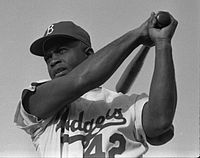Portal:Baseball/Selected biography/21
Jack Roosevelt "Jackie" Robinson (January 31, 1919 – October 24, 1972) was the first African-American Major League Baseball (MLB) player of the modern era.[1] Robinson broke the baseball color line when he debuted with the Brooklyn Dodgers in 1947. As the first black man to openly play in the major leagues since the 1880s, he was instrumental in bringing an end to racial segregation in professional baseball, which had relegated African-Americans to the Negro leagues for six decades. The example of his character and unquestionable talent challenged the traditional basis of segregation, which then marked many other aspects of American life, and contributed significantly to the Civil Rights Movement.
Apart from his cultural impact, Robinson had an exceptional baseball career. Over ten seasons, he played in six World Series and contributed to the Dodgers' 1955 World Championship. He was selected for six consecutive All-Star Games from 1949 to 1954, was the recipient of the inaugural MLB Rookie of the Year Award in 1947, and won the National League Most Valuable Player Award in 1949 – the first black player so honored. Robinson was inducted into the Baseball Hall of Fame in 1962. In 1997, Major League Baseball retired his uniform number, 42, across all major league teams.
Robinson was also known for his pursuits outside the baseball diamond. He was the first African-American television analyst in Major League Baseball, and the first African-American vice-president of a major American corporation. In the 1960s, he helped establish the Freedom National Bank, an African-American-owned/controlled financial institution based in Harlem, New York. In recognition of his achievements on and off the field, Robinson was posthumously awarded the Presidential Medal of Freedom and the Congressional Gold Medal.

